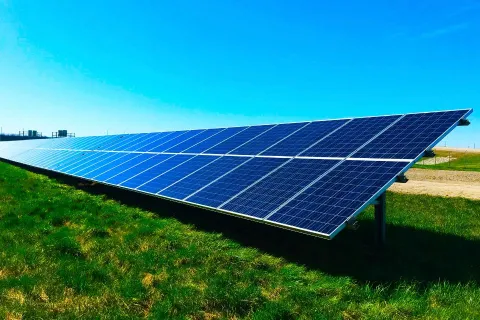Renewable energy is more popular than politicians realize

Local policymakers routinely underestimate public support for renewable energy infrastructure, according to a UBC study.
Dr. Holly Caggiano, Assistant Professor in UBC’s School of Community and Regional Planning, co-authored the recent paper and policy brief published in Nature Energy.
In this Q&A, she discusses why US policymakers’ attitudes towards renewable energy projects are a problem, as well as parallels to the Canadian context.
What motivated this study?
Research has shown that the vast majority of Americans, or up to nine out of 10 people, believe that only about 40 per cent of the country supports major climate change mitigation policies. Actually, 66 to 80 per cent of Americans are in support.
This misperception could lead policymakers to make decisions contrary to their constituents’ wants and needs. Indeed, in the US, many recent renewable energy projects have faced opposition, delay or cancellation by municipal and county policymakers.
We decided to investigate, focusing on Pennsylvania, which grants considerable autonomy to local governments and has more than 2,500 municipalities.
What did you find and what are the policy implications?
We found that support for community-owned projects was five percentage points higher than for projects owned by American companies, and that residents supported projects which created permanent jobs 12 percentage points more than projects that do not create jobs.
Residents also prefer solar to wind, nuclear and natural gas power plants with carbon capture and storage. This is true across political parties, and suggests that community benefits can create opportunities for bipartisan support for renewable energy, particularly in areas like Pennsylvania where energy is a key economic driver and which have seen recent declines in nuclear, coal and natural gas jobs.
Local elected officials, however, misperceive their constituents’ desires and underestimate the amount of support for solar energy and jobs. When asked to predict their constituents’ preferences, we saw no significant difference between preference for solar and the reference category of natural gas with carbon capture and storage, or between projects with a net increase of jobs and projects that create no new jobs.
These resident preferences align with other research on energy transitions in the US and Canada more broadly, highlighting support for community ownership and job creation in other states, provinces and communities.
Our work speaks to the importance of consistent, open dialogue between policymakers, constituents and industry about planning for energy transitions that are not one-size-fits-all. It’s ideal if this dialogue begins before a specific project is on the table so there is time to consider what benefits an energy project might bring to a local community.
What are the implications for Canadian projects and policymakers?
Decisions about renewable energy projects in Canada are also often made at the local level, so the issue is just as relevant to Canadian municipalities.
Alberta’s 2023 renewable energy moratorium that resulted in the cancellation of many projects was initiated in part in response to concern from municipalities. Polling commissioned by the Calgary Climate Hub, however, found that nearly two-thirds of Albertans opposed the moratorium.
The Pembina Institute estimated that the ban impacted more than 100 projects worth $33 billion in investments, and that these projects could have created 24,000 jobs over a year.
How might these findings relate to the current US election and potential energy issues on the campaign trail?
Many are looking to the upcoming US election as a climate turning point.
Fracking has become an election talking point over the past few weeks, as Pennsylvania is a key swing state and natural gas is an important economic driver. Vice President Harris made headlines for reversing her stance and opposing a fracking ban, even though other polls have found that most Pennsylvanians oppose it.
The amount of carbon dioxide in the atmosphere hit a new record this summer. Under the Biden administration, the US passed historic climate policy with the Inflation Reduction Act. Some have argued this Act will push Canadian firms to decarbonize to stay competitive.
While national politics and policy will surely play an outsized role in pursuing an ambitious climate agenda, an optimistic reading of our results suggests that change is possible, and critical, at the local level. Particularly in the US, where divisive politics can feel like the norm, it was encouraging to see bipartisan agreement on support for community benefits in this research.
I think people often want the same things, like wellbeing in their communities. We might have different opinions on how to get there, but it might be easier to find common ground at the local level.



